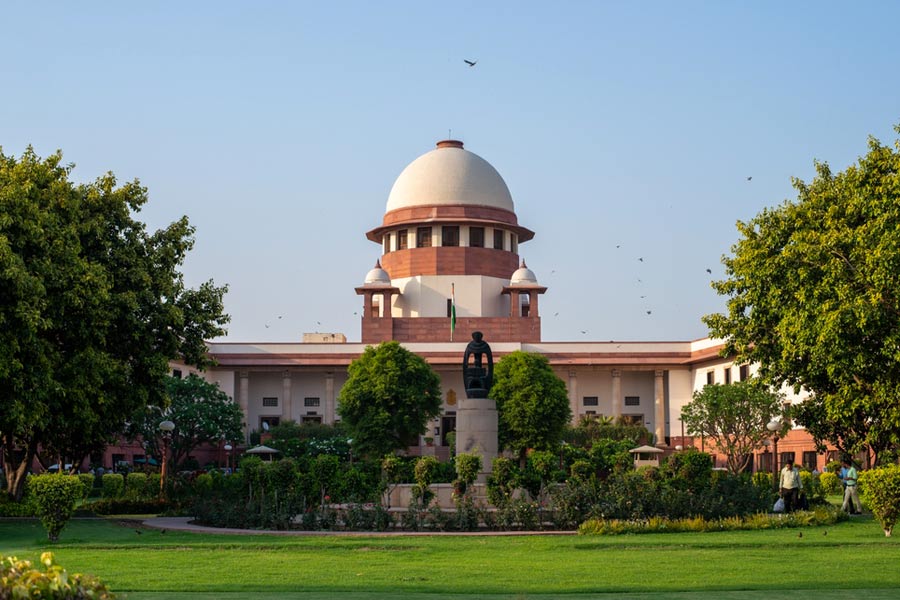The Supreme Court on Thursday observed that certain paragraphs in a Calcutta High Court verdict, which advised adolescent girls to "control sexual urges", were "problematic" and writing such judgements was "absolutely wrong".
The West Bengal government informed the apex court it has filed an appeal challenging the high court verdict.
The top court on December 8 last year had criticised the verdict and termed as "highly objectionable and completely unwarranted" some observations made by the high court.
The top court, which had initiated a suo motu writ petition in the matter, had observed that judges are not expected to "preach" while writing judgements.
The matter came up for hearing on Thursday before a bench of justices A S Oka and Ujjal Bhuyan.
Senior advocate Huzefa Ahmadi, appearing for West Bengal, informed the bench that the state has filed an appeal in the apex court against the October 18 last year verdict of the high court.
"The appeal was listed today before another bench of this court. That bench unfortunately could not sit," he said.
The bench said the suo motu writ petition and the appeal filed by state will have to be heard together.
"It is not only about observations. See the kind of findings," it observed, adding, "Writing such judgements is absolutely wrong... What kind of principles the judges have invoked." During the hearing, Ahmadi referred to one of the paragraphs in the high court verdict.
The bench said certain paragraphs in the judgement were "problematic".
"We have marked all the paragraphs," it said, adding, "In the course of this, so many findings have been recorded. Where from these concepts come, we don't know. But we want to deal with each and everything which is said. Your assistance is required." The bench asked the registry to list the suo motu writ petition and the special leave petition (SLP) filed by the state on January 12 after taking approval of the Chief Justice of India.
In its judgement, the high court had said that female adolescents should "control sexual urges" and "not give into two minutes of pleasure".
In its order passed on December 8 last year, the apex court had referred to certain observations made by the high court and said, "Prima facie, the said observations are completely in violation of the rights of the adolescents guaranteed under Article 21 of the Constitution of India." It had observed the issue before the high court was about the legality and validity of order and judgement dated September 19/20, 2022 by which a man was convicted for offences under sections 363 (kidnapping) and 366 (kidnapping, abducting or inducing woman to compel her marriage) of the Indian Penal Code as well as section 6 of the Protection of Children from Sexual Offences (POCSO) Act.
"As per the order of the the Chief Justice of India, suo motu writ petition under Article 32 of the Constitution of India has been initiated mainly due to sweeping observations/findings recorded by the division bench of the High Court of Calcutta in the impugned judgment," it had said.
The apex court had said in the appeal against conviction, the high court was called upon to adjudicate only on the merits of the appeal and nothing else.
"But we find that the high court has discussed so many issues which were irrelevant. Prima facie, we are of the view that while writing a judgment in such appeal, the judges are not expected to express their personal views. They are not expected to preach," it had said.
The high court had made the observations while hearing an appeal by a man who was given a 20-year prison term for the offence of sexual assault.
It had acquitted the man stating that this was a case of "non-exploitative consensual sexual relationship between two consenting adolescents, though consent in view of the age of the victim is immaterial".
The high court had also said it is the duty/obligation of every female adolescent to "protect her right to integrity of her body; protect her dignity and self-worth; thrive for overall development of her self transcending gender barriers; control sexual urge/urges as in the eyes of the society she is the loser when she gives in to enjoy the sexual pleasure of hardly two minutes; protect her right to autonomy of her body and her privacy".
"It is the duty of a male adolescent to respect the aforesaid duties of a young girl or woman and he should train his mind to respect a woman, her self-worth, her dignity and privacy, and her right to autonomy of her body," the high court had said.
Except for the headline, this story has not been edited by The Telegraph Online staff and has been published from a syndicated feed.










